Over 70,000 photos covering a variety of topics from Marriott Library Special Collections
TO
Filters: Collection Name: "James H. Madsen"
| Title | Date | Type | ||
|---|---|---|---|---|
| 101 |
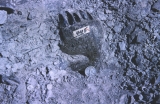 |
Left premaxilla, Allosaurus (UUVP 0445). | 1950; 1951; 1952; 1953; 1954; 1955; 1956; 1957; 1958; 1959; 1960; 1961; 1962; 1963; 1964; 1965; 1966; 1967; 1968; 1969; 1970; 1971; 1972; 1973; 1974; 1975; 1976; 1977; 1978; 1979; 1980; 1981; 1982; 1983; 1984; 1985; 1986; 1987; 1988; 1989; 1990; 1991; 1992; 1993; 1994; 1995; 1996; 1997; 1998; 1999 | Image |
| 102 |
 |
Left scapulocoracoid, Stegosaurus (UUVP 2568). | 1950; 1951; 1952; 1953; 1954; 1955; 1956; 1957; 1958; 1959; 1960; 1961; 1962; 1963; 1964; 1965; 1966; 1967; 1968; 1969; 1970; 1971; 1972; 1973; 1974; 1975; 1976; 1977; 1978; 1979; 1980; 1981; 1982; 1983; 1984; 1985; 1986; 1987; 1988; 1989; 1990; 1991; 1992; 1993; 1994; 1995; 1996; 1997; 1998; 1999 | Image |
| 103 |
 |
Left side views of Allosaurus braincase and endocast. | 1960; 1961; 1962; 1963; 1964; 1965; 1966; 1967; 1968; 1969; 1970; 1971; 1972; 1973; 1974; 1975; 1976; 1977; 1978; 1979 | Image |
| 104 |
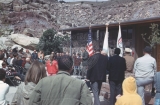 |
May be a Job Corp representative, which agency did a fine job in the construction of the C-LDQ Visitor Center. | 1960; 1961; 1962; 1963; 1964; 1965; 1966; 1967; 1968; 1969; 1970; 1971; 1972; 1973; 1974; 1975; 1976; 1977; 1978; 1979 | Image |
| 105 |
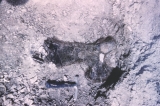 |
Medial view of right scapula, Stegosaurus. | 1960; 1961; 1962; 1963; 1964; 1965; 1966; 1967; 1968; 1969; 1970; 1971; 1972; 1973; 1974; 1975; 1976; 1977; 1978; 1979 | Image |
| 106 |
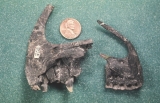 |
Medial views of premaxilla. Left is Marshosaurus, right is Allosaurus. | 1960; 1961; 1962; 1963; 1964; 1965; 1966; 1967; 1968; 1969; 1970; 1971; 1972; 1973; 1974; 1975; 1976; 1977; 1978; 1979 | Image |
| 107 |
 |
Mid-dorsal vertebra, Camarasaurus. | 1950; 1951; 1952; 1953; 1954; 1955; 1956; 1957; 1958; 1959; 1960; 1961; 1962; 1963; 1964; 1965; 1966; 1967; 1968; 1969; 1970; 1971; 1972; 1973; 1974; 1975; 1976; 1977; 1978; 1979; 1980; 1981; 1982; 1983; 1984; 1985; 1986; 1987; 1988; 1989; 1990; 1991; 1992; 1993; 1994; 1995; 1996; 1997; 1998; 1999 | Image |
| 108 |
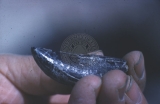 |
Mid-maxillary (?) Tooth of Allosaurus. | 1960; 1961; 1962; 1963; 1964; 1965; 1966; 1967; 1968; 1969; 1970; 1971; 1972; 1973; 1974; 1975; 1976; 1977; 1978; 1979 | Image |
| 109 |
 |
More clapping and smiling. | 1960; 1961; 1962; 1963; 1964; 1965; 1966; 1967; 1968; 1969; 1970; 1971; 1972; 1973; 1974; 1975; 1976; 1977; 1978; 1979 | Image |
| 110 |
 |
The most demanding step in the study of dinosaurs takes place in the preparation laboratory, where a single bone may require more than a hundred hours of intense work before it can be analyzed in detail. | 1960; 1961; 1962; 1963; 1964; 1965; 1966; 1967; 1968; 1969; 1970; 1971; 1972; 1973; 1974; 1975; 1976; 1977; 1978; 1979 | Image |
| 111 |
 |
Most fossil bones are fractured, so must be coated with a preservative, as soon as they are uncovered and allowed to dry, to seal the fossil and fasten the numerous, tiny fragments in place. This step is necessary before the fossils can be safely removed and transported to the laboratory for final preparation and study. | 1961-06 | Image |
| 112 |
 |
Much of the necessary preparation of fossil bones, as demonstrated on this premaxilla of Allosaurus, is done with a miniature air hammer called an AirScribe. The AirScribe is an indispensable tool in the careful preparation of most dinosaur bones. | 1960; 1961; 1962; 1963; 1964; 1965; 1966; 1967; 1968; 1969; 1970; 1971; 1972; 1973; 1974; 1975; 1976; 1977; 1978; 1979 | Image |
| 113 |
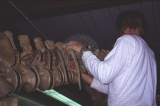 |
The neck, ribs, chevrons, and forearms are fastened in place as one of the final steps in the assembly. | 1968-10 | Image |
| 114 |
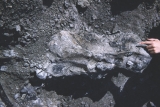 |
Neural spine, sauropod (?), enclosed in the softer shale unit. | 1950; 1951; 1952; 1953; 1954; 1955; 1956; 1957; 1958; 1959; 1960; 1961; 1962; 1963; 1964; 1965; 1966; 1967; 1968; 1969; 1970; 1971; 1972; 1973; 1974; 1975; 1976; 1977; 1978; 1979; 1980; 1981; 1982; 1983; 1984; 1985; 1986; 1987; 1988; 1989; 1990; 1991; 1992; 1993; 1994; 1995; 1996; 1997; 1998; 1999 | Image |
| 115 |
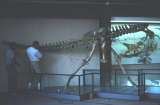 |
Next in the order of assembly, the dorsal (back) and caudal (tail) sections are attached to keep the mount in balance. (October 1988) | 1968-10 | Image |
| 116 |
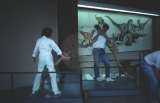 |
Next the legs are fastened to the mounting deck of the exhibit. | 1968-10 | Image |
| 117 |
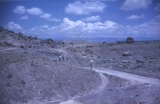 |
Northerly view of quarry from Visitor Center. | 1950; 1951; 1952; 1953; 1954; 1955; 1956; 1957; 1958; 1959; 1960; 1961; 1962; 1963; 1964; 1965; 1966; 1967; 1968; 1969; 1970; 1971; 1972; 1973; 1974; 1975; 1976; 1977; 1978; 1979; 1980; 1981; 1982; 1983; 1984; 1985; 1986; 1987; 1988; 1989; 1990; 1991; 1992; 1993; 1994; 1995; 1996; 1997; 1998; 1999 | Image |
| 118 |
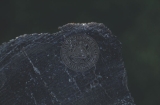 |
Notice the banded structure of this thin slice of fossilized bone. Studies are being made to determine the significance of the individual layers; which, if representing annulations or yearly growth rings, as seen in trees, might permit paleontologists to ascertain the age of an individual dinosaur. (May 1968) | 1968-05 | Image |
| 119 |
 |
On this Land-Sat photo of the State of Utah, heavily vegetated areas are red, unvegetated areas are light colored, and bodies of water are dark blue. Notice three prominent landforms: Great Salt Lake, the east-west aligned Uinta Mountains in the northeast corner of the state, and the San Rafael Swell in the eastcentral area. (May 1984) | 1984-05 | Image |
| 120 |
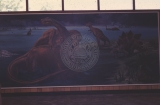 |
Painting interpretation of dinosaur life. | 1950; 1951; 1952; 1953; 1954; 1955; 1956; 1957; 1958; 1959; 1960; 1961; 1962; 1963; 1964; 1965; 1966; 1967; 1968; 1969; 1970; 1971; 1972; 1973; 1974; 1975; 1976; 1977; 1978; 1979; 1980; 1981; 1982; 1983; 1984; 1985; 1986; 1987; 1988; 1989; 1990; 1991; 1992; 1993; 1994; 1995; 1996; 1997; 1998; 1999 | Image |
| 121 |
 |
Paired pubes of a large Allosaurus (UUVP 0918, 0919). | 1950; 1951; 1952; 1953; 1954; 1955; 1956; 1957; 1958; 1959; 1960; 1961; 1962; 1963; 1964; 1965; 1966; 1967; 1968; 1969; 1970; 1971; 1972; 1973; 1974; 1975; 1976; 1977; 1978; 1979; 1980; 1981; 1982; 1983; 1984; 1985; 1986; 1987; 1988; 1989; 1990; 1991; 1992; 1993; 1994; 1995; 1996; 1997; 1998; 1999 | Image |
| 122 |
 |
Pause by Senator Moss. | 1960; 1961; 1962; 1963; 1964; 1965; 1966; 1967; 1968; 1969; 1970; 1971; 1972; 1973; 1974; 1975; 1976; 1977; 1978; 1979 | Image |
| 123 |
 |
Pelvic elements of Marshosaurus. | 1960; 1961; 1962; 1963; 1964; 1965; 1966; 1967; 1968; 1969; 1970; 1971; 1972; 1973; 1974; 1975; 1976; 1977; 1978; 1979 | Image |
| 124 |
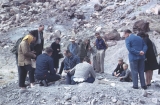 |
Peterson continues with his analysis as Senator Moss and others look on. | 1960; 1961; 1962; 1963; 1964; 1965; 1966; 1967; 1968; 1969; 1970; 1971; 1972; 1973; 1974; 1975; 1976; 1977; 1978; 1979 | Image |
| 125 |
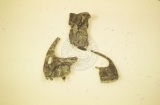 |
The premaxillae of Marshosaurus to the left, and Stokesosaurus above, each with four teeth are compared with one of a very small Allosaurus to the right, which has alveoli for five teeth. Although all three of these dinosaurs were carnivorous, notice the difference in the shape of the tooth bearing bones. Similarly, if the teeth of each were present, they could be easily identified, one from another. (April 1972) | 1972-04 | Image |
